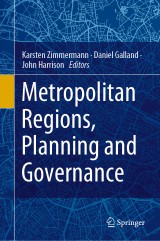Details

Metropolitan Regions, Planning and Governance
|
128,39 € |
|
| Verlag: | Springer |
| Format: | |
| Veröffentl.: | 24.10.2019 |
| ISBN/EAN: | 9783030256326 |
| Sprache: | englisch |
Dieses eBook enthält ein Wasserzeichen.
Beschreibungen
<p>The aim of this book is to investigate contemporary processes of metropolitan change and approaches to planning and governing metropolitan regions. To do so, it focuses on four central tenets of metropolitan change in terms of planning and governance: institutional approaches, policy mobilities, spatial imaginaries, and planning styles. The book’s main contribution lies in providing readers with a new conceptual and analytical framework for researching contemporary dynamics in metropolitan regions. It will chiefly benefit researchers and students in planning, urban studies, policy and governance studies, especially those interested in metropolitan regions.</p><p>The relentless pace of urban change in globalization poses fundamental questions about how to best plan and govern 21st-century metropolitan regions. The problem for metropolitan regions—especially for those with policy and decision-making responsibilities—is a growing recognition that these spaces are typically reliant on inadequate urban-economic infrastructure and fragmented planning and governance arrangements. Moreover, as the demand for more ‘appropriate’—i.e., more flexible, networked and smart—forms of planning and governance increases, new expressions of territorial cooperation and conflict are emerging around issues and agendas of (de-)growth, infrastructure expansion, and the collective provision of services.<br></p><div><br></div>
Conceptualising Metropolitan Regions: How Institutions, Policies, Spatial Imaginaries and Planning are Influencing Metropolitan Development.- Part I: Institutions and Contemporary Institutional Shifts.- Metropolitan Revolution or Metropolitan Evolution? The (Dis)continuities in Metropolitan Institutional Reforms.- The Multiple Agencies of Metropolitan Institutions: Is There Convergence?.- What is at Stake for Metropolitan Regions and Their Governance Institutions?.- Part II: Policies and Ideas.- Learning from Elsewhere? A Critical Account on the Mobilisation of Metropolitan Policies.- From Here to There: Mapping the Metropolitan Politics of Policy Mobilities.<p></p>
<div><div><div><div>Karsten Zimmermann is Professor for European Planning Cultures at the Faculty of Spatial Planning, Dortmund Technical University, Germany, and President of the European Urban Research Association (EURA).</div><div><br></div><div>Daniel Galland is Associate Professor in the Department of Urban and Regional Planning at the Norwegian University of Life Sciences (NMBU) and Chair of the Excellence in Education Board of the Association of European Schools of Planning (AESOP).</div><div><br></div><div>John Harrison is Reader in Human Geography at Loughborough University, UK, and an Associate Director of the Globalization and World Cities (GaWC) research network.</div></div></div></div>
<p>The aim of this book is to investigate contemporary processes of metropolitan change and approaches to planning and governing metropolitan regions. To do so, it focuses on four central tenets of metropolitan change in terms of planning and governance: institutional approaches, policy mobilities, spatial imaginaries, and planning styles. The book’s main contribution lies in providing readers with a new conceptual and analytical framework for researching contemporary dynamics in metropolitan regions. It will chiefly benefit researchers and students in planning, urban studies, policy and governance studies, especially those interested in metropolitan regions.</p><p><br></p><p>The relentless pace of urban change in globalization poses fundamental questions about how to best plan and govern 21st-century metropolitan regions. The problem for metropolitan regions—especially for those with policy and decision-making responsibilities—is a growing recognition that these spaces are typically reliant on inadequate urban-economic infrastructure and fragmented planning and governance arrangements. Moreover, as the demand for more ‘appropriate’—i.e., more flexible, networked and smart—forms of planning and governance increases, new expressions of territorial cooperation and conflict are emerging around issues and agendas of (de-)growth, infrastructure expansion, and the collective provision of services.</p>
Structured around four key themes: institutions, policies, imaginaries and planning Presents the outcomes of a three-year-long international collaboration Positions contemporary research on metropolitan change and approaches to planning and governing metropolitan regions within longer trajectories
Diese Produkte könnten Sie auch interessieren:

Der Aufstand der Jugendlichen in den Banlieues: Eine Analyse der Pariser Unruhen von 2005

von: Ahmed El- Mamouni

23,00 €















